
Turkey maintains open relations with internationally sanctioned extremist groups and harbors internationally sanctioned and wanted extremists affiliated with the Taliban, the Muslim Brotherhood, and Hamas. Taliban officials maintain a presence in Turkey, while several Brotherhood leaders sought refuge there after the collapse of the Brotherhood government in Egypt. Hamas has operated a bureau in Istanbul since 2012.

The violent Turkish extremist group Grey Wolves freely operates across the country and maintains ties with members of the Turkish government.

Turkey has not devoted the appropriate resources to monitoring the financial workings of its non-profit sector, according to the U.S. Department of State. In particular, the NGO Turkish Humanitarian Relief Foundation faces international accusations of aiding Syrian rebel forces, al-Qaeda, and Hamas.

Turkish financial institutions, with support of Turkish officials, have aided in skirting U.S. sanctions against Iran.
Overview
Longtime U.S. ally Turkey—a member of the Global Coalition to Counter ISIS and NATO—has supported and harbored international terrorist organizations and individuals. The Turkish government has lent support to the Muslim Brotherhood, * Hamas, * and Syrian rebel groups. * Turkey continues to harbor members of the Muslim Brotherhood who sought refuge in the country after the 2015 fall of the Brotherhood government in Egypt. * In addition, the violent Turkish extremist group Grey Wolves formally operates as a political and cultural organization, but their extremist ideology has also inspired non-members to violent acts. * Breakaway groups, including the Osmanlı Ocakları and the Alperen Hearths, have also carried out attacks on groups demonized by the Grey Wolves, such as Kurds, Armenians, and the opposition Democratic Peoples’ Party in Turkey. * The group has also been linked to the Turkish intelligence agency MIT, and their crimes often went unpunished by the Turkish police. *
According to the U.S. Department of State, Turkey is host to terrorist organizations with links to narcotics trafficking. As such, the U.S. government has declared Turkey “vulnerable to money laundering and terrorist finance risks.” * Further, the Turkish government has allowed terror-linked charities to operate within the country. Most prominently, the Turkish Humanitarian Relief Foundation (IHH) has been linked to al-Qaeda, * Hamas, * Syrian rebel groups, * and foreign fighters in Chechnya, Bosnia, and Afghanistan. *
Direct Funding and Government Support
The Turkish government has provided direct funding and support for various extremist organizations operating within the country. These groups include the Taliban, the Taliban-affiliated Haqqani network, * the Muslim Brotherhood, * Grey Wolves, * and Hamas. * The Turkish government has allowed members of these groups to openly reside in the country, as well as address government officials and functions.
 Taliban
Taliban
The Taliban is an Afghanistan- and Pakistan-based jihadist insurgent group that has carried out numerous deadly terrorist attacks in the region, including the shooting of Malala Yousafzai in Pakistan’s Swat Valley in October 2012, the December 2015 assault on Kandahar Air Field which left 50 dead, and the December 2014 massacre at the army-run school in Peshawar that killed 148 people, 132 of whom were schoolchildren. Taliban insurgents and ISIS militants in eastern Afghanistan have cooperated against the Afghan government since mid-2016. The Haqqani network is a militant branch of the Afghan Taliban operating in Afghanistan and Pakistan, though it operates independently. Since the 2001 overthrow of the Taliban regime in Afghanistan, the Haqqani network has been a lethal and sophisticated arm of the Afghan insurgency against the Western-backed government in Kabul. After the Taliban violently seized control of Afghanistan in August 2021, Turkey was one of a handful of countries that maintained its diplomatic presence in the country. Turkey called on other government to establish ties with the Taliban government while making overtures to increasing diplomatic and economic cooperation with the Taliban. *
Taliban Designated by:
Canada, EU, France, Kazakhstan, New Zealand, Russia, United Arab Emirates, United Kingdom, United Nations, United States
Haqqani network designated by:
United Nations, United States
Turkish Support:
- Beginning in late 2017, members of the Taliban have met with Afghan officials in Turkey for peace talks. In January 2018, Taliban spokesman Zabihullah Mujahid stated that the Taliban members meeting in Turkey do not represent the group. Mawlawi Abdul Rauf, leader of the Turkish delegation, said that his group represents all Taliban factions, including the Haqqani network. *
- In 2012, Turkey sought to host a Taliban office in the country. The Taliban instead opened its office in Qatar. *
- The Haqqani network has facilitated the travel of jihadist foreign fighters into and through Turkey since at least 2013, according to the U.S. government. *
- Turkey has called on the international community to engage with Afghanistan’s Taliban government after the terror network seized control in August 2021. Turkish officials have also clarified that recognition and engagement are separate issues. In October 2021, Turkish Foreign Minister Mevlut Cavusoglu stated the international community’s goal should be preventing the collapse of the Afghan economy. *
- Turkey is the only NATO member with diplomatic presence in Afghanistan. In October 2021, Turkey hosted Amir Khan Muttaqi, the Taliban’s acting foreign minister, for high-level talks. As of November 2022, Turkey has invested hundreds of millions of dollars in a hydroelectric dam in Helmand province. *
- At the October 2022 “Islamic Scholars Meeting” conference in Turkey’s southeastern province of Diyarbakir, the Taliban’s deputy minister of information and culture, spokesman Zabihullah Mujahid, emphasized that the Taliban considers the Turkish government to be a “close friend.” At the conference, Mujahid appealed to senior officials from Turkey, Syria, Jordan, Lebanon, Iran, Iraq, and Libya to officially recognize the Islamic Emirate of Afghanistan. *
 Muslim Brotherhood
Muslim Brotherhood
The Muslim Brotherhood—founded in Egypt in 1928—is a transnational Islamist organization with branches worldwide. In the 1950s, Brotherhood theologian Sayyid Qutb legitimized the use of violent jihad—and the killing of secular Muslims—in order to implement sharia. Analysts argue that the Brotherhood’s ideology has spawned groups such as al-Qaeda and ISIS.
Designated by:
Bahrain, Egypt, Russia, Saudi Arabia, Syria, United Arab Emirates
Turkish Support:
- Members of Turkey’s leading Justice and Development Party (AKP)—including Turkish President Recep Tayyip Erdoğan—have provided various forms of support to the Brotherhood, including granting asylum to wanted Brotherhood members and equipping them with satellite television and radio stations. Despite being charged in absentia by the Egyptian government, some Brotherhood fugitives have been allowed to openly congregate in Turkey and organize against the Egyptian government. *
- Turkey allows a handful of pro-Brotherhood media stations to operate within the country. Stations such as Rabia TV, al-Sharq, and al-Watan (formerly Misr Alaan)—run by exiled Egyptian Brotherhood members such as former Secretary-General Mahmoud Hussein and Brotherhood politician Basim al-Khafagy—often broadcast pro-Islamist messaging including glorified accounts of Brotherhood clashes with the Egyptian government and threats directed at Western-owned companies in Egypt to leave the country. * In February 2015, these channels broadcasted threats against Egypt. * This followed a January 29, 2015, broadcast on Rabia TV warning foreign nationals to leave Egypt or face violence. * In March 2021, the Turkish government requested the Brotherhood channels decrease their criticism of Egypt as Turkey sought to repair its relationship with the country. The Brotherhood did not comment on the request. *
- Despite restoring diplomatic contacts with Egypt in March 2021, Turkey remains opposed to Egypt’s designation of the Brotherhood as a terrorist organization. *
- Ali al-Qaradaghi, secretary-general of the International Union of Muslim Scholars (IUMS), a Qatari-based Muslim Brotherhood-linked organization, appeared at the October 2022 “Islamic Scholars Meeting” conference in Turkey’s southeastern province of Diyarbakir. The conference also hosted Taliban spokesman Zabihullah Mujahid, and other officials from Turkey, Syria, Jordan, Lebanon, Iran, Iraq, and Libya. * The IUMS was previously led by the late Yusuf al-Qaradawi—an Islamist theologian and the unofficial chief ideologue of the Muslim Brotherhood—and Qaradaghi has defended Qaradawi from accusations of supporting terrorism, though both have been vocal advocates for the Muslim Brotherhood and Hamas. *
 Hamas
Hamas
The ruling terror party of the Gaza Strip, Hamas openly seeks the destruction of Israel. The group uses suicide bombings, rocket and mortar attacks, shootings, and kidnappings in pursuit of its stated objectives.
Designated by:
Australia, Canada, Egypt, EU, Israel, Japan, Jordan, New Zealand, United Kingdom, United States
Turkish Support:
- In 2012, Hamas’s leadership fled Syria after the outbreak of that country’s civil war. Hamas military leader Saleh Arouri first relocated to Turkey, where he was suspected of building a Hamas bureau in Istanbul. Arouri directed and financed Hamas military cells in the West Bank and Jordan, according to the U.S. Treasury, which accuses Arouri of facilitating the transfer of hundreds of thousands of dollars to Hamas’s militant activities. *
- Prior to Khaled Meshaal’s May 2017 retirement as Hamas’s political bureau chief, the Turkish government regularly engaged with Meshaal. * Meshaal reportedly met with Iranian officials and Turkish officials in the country. * In December 2014, he made a surprise appearance at the ruling Justice and Development Party’s annual congress. * Meshaal stepped down as Hamas’s political bureau chief in May 2017. *
- Turkish authorities have reportedly overseen Hamas military training exercises in the country. Hamas operatives in Turkey have actively recruited Palestinians living in Turkey, Jordan, Syria, and other Arab countries. The recruits are sent to the bureau in Istanbul, where they reportedly receive security clearances and begin training outside of the city, allegedly with the knowledge of Turkish officials. In addition, many of the weapons used by Hamas operatives in the West Bank were reportedly supplied by the group’s Istanbul bureau. * In December 2015, the Turkish government expelled Arouri, reportedly at Israel’s request, as part of a reconciliation agreement between the two countries. *
- Following the June 2016 reconciliation deal between Turkey and Israel, former Hamas official Ahmed Youssef told media that Turkey’s willingness to discuss the agreement with Hamas demonstrated that “Hamas-Turkish ties are at their best.” * Further, Turkish Foreign Minister Mevlut Cavusoglu pledged that his government would continue to meet with Hamas leaders. *
- In August 2017, Israel’s Shin Bet security agency uncovered a Hamas money-laundering ring that transferred funds from Turkey to the West Bank. Turkey-based Hamas operative Haron Nasser al-Din allegedly transferred approximately $200,000 to the West Bank between 2016 and 2017. *
- In February 2017, Israeli authorities arrested Muhammad Murtaja, coordinator of the Gaza branch of the Turkish Cooperation and Coordination Agency (TIKA), as he was allegedly attempting to travel to Turkey at the behest of Hamas members there. According to the indictment against him, Murtaja was part of a Hamas plot to appropriate funds from TIKA. TIKA allegedly transferred funds to Hamas between 2012 and 2016 through official staff trips. In 2018, Murtaja was sentenced to nine years in prison. *
- The Turkish government condemned the U.S. government’s January 2017 sanction-designation of Hamas leader Ismail Haniyeh. Turkish Foreign Ministry spokesman Hami Aksoy called Hamas “an important reality of Palestinian political life.” *
- A Hamas official in Istanbul, Zacharia Najib, reportedly ordered failed assassination attempts on Israeli government officials in February 2019. Najib provided weapons, training, and funding to a Hamas member in Jerusalem who was arrested before he could carry out the plot. A Turkish diplomat at the time called Hamas a legitimate political party and denied it had any links to terrorism. *
- In August 2020, Turkey reportedly began granting citizenship to a dozen high-ranking Hamas members in the country. According to the Telegraph, those receiving citizenship are “the most senior Hamas operatives outside of Gaza. [They] are actively raising funds and directing operatives to carry out attacks in the present day.” The Turkish government refused comment and called the accusations baseless. *
- According to an October 2020 Times article, intelligence services discovered that Hamas set up a headquarters in Istanbul to carry out cyberwarfare and counter-intelligence operations targeting their enemies. According to the western intelligence sources, the unit—which is directed by senior official Samakh Saraj of Hamas’s military leadership in Gaza—was set up in 2018 and is separate from Hamas’ official offices. Media sources noted that Saraj mainly reports to senior official Yahya Sinwar. However, the Turkish government reportedly was not made aware that the unit set up operations in Istanbul. *
- On January 26, 2021, Israeli authorities seized more than $120,000 and goods worth hundreds of thousands of shekels that Hamas was allegedly transferring from Turkey to the West Bank. According to the Israeli Defense Ministry, Hamas used West Bank-based company Sense Sanitary Company and Turkish company Tikkno Plus Ic Ve Dis to transfer the money and goods to the West Bank. The companies are jointly owned by Hamas operatives Abdallah Fuqaha in Turkey and Ayman al-Massri in the West Bank. *
- As Israel demanded Turkey end its support as part of reconciliation efforts between the two countries, a senior Turkish official told Al-Monitor in December 2021 that ending Hamas’s operations in Turkey “is not even an option open for negotiation for us.” *
- In May 2022, the U.S. Department of the Treasury’s Office of Foreign Assets Control (OFAC) sanctioned Turkey-based investment company Trend GYO for being owned, controlled, or directed by, directly or indirectly, Hamas. According to OFAC, as of 2018 Hamas elements held about 75 percent of Trend GYO’s issued capital. The Treasury Department further charged that Hamas intended to privately issue more than $15 million of Trend GYO’s shares to senior officials in the investment portfolio. OFAC also designated Turkey-based Hisham Younis Yahia Qafisheh, who aided the transfer of funds on behalf of various companies linked to Hamas’s investment portfolio and served as the deputy chairman of the board of Trend GYO.*“Treasury Targets Covert Hamas Investment Network and Finance Official,” U.S. Department of the Treasury, May 24, 2022, https://home.treasury.gov/news/press-releases/jy0798.x
- In October 2022, senior members of Hamas met with a delegation of Taliban leaders in Turkey. According to a Hamas statement, Taliban spokesman Zabihulla Mujahid met with Hamas leader Ismail Haniyeh and other Hamas representatives where they discussed “several regional issues” and the need to further bilateral relations “alongside the cause of Palestine.” *
- In November 2022, Turkey declined a request by Israel to deport Hamas members as Minister of the Interior Mevlut Cavusoglu told a Turkish news outlet that Turkey does “not see Hamas as a terrorist organization.” *
- After the July 31, 2024, assassination of Hamas political chief Ismail Haniyeh in Iran, Turkish President Recep Tayyip Erdoğan denounced the assassination on X, formerly Twitter, as a “shameful” and “odious attack” that “aims to sabotage” the “glorious Gazan resistance and our Palestinian brothers’ just fight….” Erdoğan blamed “Zionist barbarity” for Haniyeh’s death. On August 2, Erdoğan declared a day of mourning for Haniyeh. Turkey’s embassy in Tel Aviv lowered its flag to half-mast, prompting Israeli officials to call for a reprimand of Turkey’s ambassador. *
 Grey Wolves
Grey Wolves
Also known as Ülkü Ocakları (Idealist Hearths) in Turkish, Grey Wolves is an international fascist, Turkish nationalist, and pan-Turkic organization and movement * that formally operates as a political and cultural organization in Turkey. Its extremist ideology has also inspired non-members to violent acts. *
Designated by:
Austria, France, Kazakhstan
Turkish Support:
- Turkish politician Alparslan Türkeş formed the Wolves in 1966, just three years after he founded the Nationalist Movement Party (MHP), a participant in Turkey’s current (as of July 2021) governing coalition. *
- The Wolves functioned as the MHP’s armed branch in the 1970s, carrying out attacks and assassinations on leftists, journalists, and dissidents. * The group is still tied to the MHP, and Grey Wolves members view the political party’s current chairman, Devlet Bahçeli, as the leader of the organization. * The Wolves continue to act at times as the street movement or paramilitary organization of the party. *
- The Wolves have chapters and sympathetic movements spread across cities and universities in Turkey, as well as provincial unions, such as the Istanbul Union. *
- The Wolves have also been linked to Turkey’s security and intelligence forces (MIT). The group was most directly linked to state security forces at the height of its violent acts in the late 1970s, when the organization received weapons from the Counter-Guerrilla Organization.*
- A 1998 report from the Turkish parliament cited the connection of a former senior member of the Wolves—Abdullah Çatlı— to “organized crime, heroin smuggling, and political assassinations carried out in collaboration with the Turkish security forces.” * Çatlı was employed by the Turkish secret police on multiple occasions and became involved in “anti-Kurdish” operations.* He served the deputy leader of the Grey Wolves in Turkey in 1978 but later went undercover when he was linked to the murder of seven trade unionists.* Çatlı also aided Mehmet Ali Ağca, who went on to shoot Pope John Paul II, in his escape from Turkish prison. Çatlı was killed in a car accident in November 1996. *
- In June 2022, Grey Wolves members located in Turkey and Bosnia and Herzegovina reportedly sent threats via phone calls, text messages, and social media targeting Balkan journalists. The journalists were sent threatening messages after they reported on the Grey Wolves branch and their activities in Bosnia and Herzegovina. *
Harboring Terrorist Leaders and Financiers
Turkey harbors internationally designated and wanted extremist leaders.
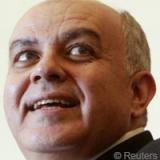
Amr Darrag
Senior Muslim Brotherhood Member
- Founding member of the Egyptian Brotherhood’s outlawed Freedom and Justice Party (FJP) on whose platform Mohammed Morsi ran for president. *
- Served as Egypt’s former minister of planning and international cooperation during the last two months of Morsi’s presidency. *
- Claims he was warmly received in Turkey in September 2014. *
- Heads the Egyptian Institute for Political and Strategic Studies in the Istanbul suburb of Yenibosna. *
- Retired from political positions in the Brotherhood in 2016 but remains a member and supporter of the group. *
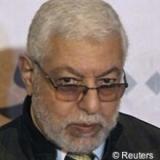
Mahmoud Hussein
Former Secretary-General of the Muslim Brotherhood, former Member of the Shura Council
- Served as the group’s secretary-general from 2010 until 2020, though the position was contested by members of the Brotherhood’s revolutionary youth. *
- Served several prison terms in Egypt for involvement in the Muslim Brotherhood. *
- Reportedly moved to Turkey in September 2014. *
- Hussein was ousted from his leadership role in the Brotherhood in September 2020 over accusations of embezzling funds.*
- Following the November 4, 2022, death of acting supreme guide Ibrahim Mounir, the Brotherhood’s Shura Council named Hussein as the new acting guide.*
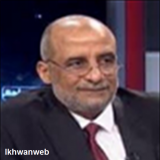
Talaat Fahmi
Former Spokesman for the Muslim Brotherhood
- Appointed spokesman in December 2015. *
- Reportedly based in Turkey since 2015. *
- Dismissed as the group’s spokesman in October 2021.*“Muslim Brotherhood renews confidence in deputy head Mounir,” Middle East Monitor, October 14, 2021, https://www.middleeastmonitor.com/20211014-muslim-brotherhood-renews-confidence-in-deputy-head-mounir/.x
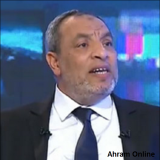
Ahmed Abdel Rahman
Head of the Egyptian Brotherhood’s Office for Egyptians Abroad
- Rahman is a longtime member of the Muslim Brotherhood in Egypt. As head of the Office for Egyptians Abroad, Rahman manages the affairs of exiled Brotherhood members, as well as the activities of younger leaders on the ground in Egypt. *
- Rahman is reportedly based in Istanbul. * In April 2015, a group of exiled, Istanbul-based Brotherhood members announced the establishment of the Office for Egyptians Abroad under Rahman’s leadership. *
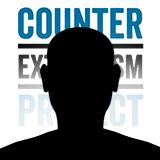
Gula Khan Hamidi
Haqqani Network Member
- In January 2018, the U.S. government sanction-designated Hamidi for assisting in or providing financial, material, or technological support to the Haqqani network. The government accused Hamidi of facilitating the travel of Haqqani members from Pakistan to Turkey. *
- Allegedly facilitated the travel of foreign fighters through Turkey. According to the U.S. Treasury Department, Hamidi “facilitated the movement of two groups of foreign fighters to Turkey from Pakistan” in 2013 and also “coordinated the travel of al Qaeda and Tehrik-e Taliban Pakistan associates to Turkey” in October 2014. *
- Allegedly operates in Istanbul, Turkey, as well as Afghanistan. *
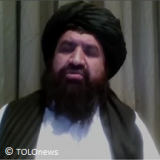
Abdul Rauf
Purported Leader of the Taliban Delegation in Turkey
- Represented the Taliban in Turkey-based negotiations with the Afghan government since late 2017. Rauf has said that his group represents all Taliban factions—including the Haqqani Network—except “individuals who are not willing to opt for intra-Afghan peace talks and who want to talk through Americans.” *
- Rauf previously served as a governor for the Taliban regime from 1996 to 2001. *
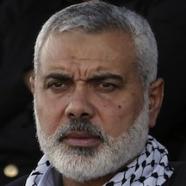
Ismail Haniyeh
Chief of Hamas’s Political Bureau
- Based in Qatar, Haniyeh had been a regular visitor to Turkey. He had praised Turkey for its “critical” role providing political support for Hamas and the Palestinian cause.
- In August 2020, Turkish President Recep Tayyip Erdoğan hosted Haniyeh and other Hamas leaders. The United States condemned Turkey’s “continued outreach” to Hamas, while the Turkish government rejected the criticism and called on the United States to adopt a more “balanced policy." *
- After Haniyeh’s assassination on July 31, 2024, Erdoğan denounced the act on X, formerly Twitter, as a “shameful” and “odious attack” that “aims to sabotage” the “glorious Gazan resistance and our Palestinian brothers’ just fight….” Erdoğan blamed “Zionist barbarity” for Haniyeh’s death. On August 2, Erdoğan declared a day of mourning for Haniyeh. Turkey’s embassy in Tel Aviv lowered its flag to half-mast, prompting Israeli officials to call for a reprimand of Turkey’s ambassador. *
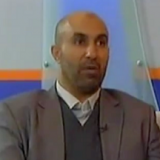
Zaher Jabarin
Hamas financial manager, recruiter, senior military commander
- A convicted Hamas terrorist who was released from an Israeli prison in 2011 as part of a prisoner exchange deal for captured Israeli soldier Gilad Shalit. Following his release, Jabarin resettled in Turkey and rejoined Hamas as a senior leader. * The United States sanctioned Jabarin in September 2019. *
- Recruited individuals to facilitate money laundering operations for Hamas in Turkey. * Two of these individuals, Turkish national Cemil Tekeli and Arab-Israeli citizen Durgham Jabarin (no relation), were arrested in Israel in January 2018. * Zaher Jabarin allegedly recruited Tekeli to help Hamas members set up businesses, acquire visas, and obtain commercial property in Turkey. *
- Jabarin continues to travel freely. In February 2021, he joined a Hamas political delegation in Russia to meet with Russian Deputy Foreign Minister and Presidential Special Envoy for the Middle East and Africa Mikhail Bogdanov.*
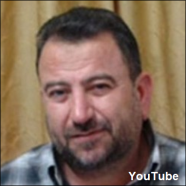
Saleh al-Arouri
Hamas leader in the West Bank
- Arouri has facilitated money and weapons transfers for Hamas since the 1980s and helped found the West Bank branch of Hamas’s military wing. * Hamas elected Arouri as deputy leader of its political bureau in October 2017. *
- Arouri allegedly coordinated the June 2014 kidnapping and murder of three Israeli teenagers in the West Bank, which sparked that summer’s conflict between Israel and Hamas. *
- Arouri reportedly created and ran Hamas’s bureau in Turkey until his expulsion from the country in 2015. * He remains based in Lebanon but has been seen attending Hamas events in Turkey. *
- In 2021, Hamas elected Arouri to serve as its leader in the West Bank during secretive internal elections. The appointment is for four years.*
- Israeli forces broke up a Hamas cell in the West Bank on November 22, 2021. Israel’s Shin Bet security service accused Arouri and Turkey-based Hamas operative Zacharia Najib—released during the 2011 Gilad Shalit prisoner swap—of directing the cell from Turkey.*

Haroun Mansour Yaqoub Nasser al-Din
Hamas financier
- Al-Din is reportedly involved in a finance network that coordinated the transfer of funds from Turkey and Gaza to Hamas’s command center in Hebron, West Bank. *
- The United States accuses al-Din of working with Saleh al-Arouri to increase instability across the West Bank on behalf of Hamas. *
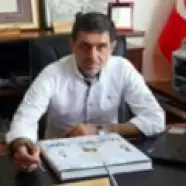
Jihad Muhammad Shaker Yaghmour
Hamas representative to Turkey
- Israel sentenced Yaghmour to life in prison in 1994 for his participation in the abduction of Israeli soldier Nahshon Waxman. Yaghmour was released in October 2011 as part of a prisoner swap between Hamas and Israel for captured Israeli soldier Gilad Shalit. *

Mehmet Kaya
Hamas Financier
- The United States accuses Kaya of coordinating and providing the transfer of tens of millions of dollars for Hamas. *

Zacharia Najib
Hamas member
- Participated in the 1994 kidnapping and killing of Israeli soldier Nachshon Wachsman. *
- Released in the 2011 prisoner exchange for Israeli soldier Gilad Schalit. *
- Allegedly involved in a failed Hamas plot to assassinate Israelis abroad in 2019. *
- Accused of leading a Hamas cell in Turkey with Saleh al-Arouri in November 2021. According to Israel’s Shin Bet, Arouri and Najib recruited operatives from Palestinian cities and towns across the West Bank for planned attacks on Israel. The Shin Bet accused Najib of running the cell from Turkey with Arouri. *

Samakh Saraj
Director of Hamas’s cyberwarfare and counter-intelligence unit in Istanbul
- Although based in Gaza, senior military leader Saraj directs Hamas’s cyberwarfare and counterintelligence unit in Istanbul. The unit was established in 2018 outside of the knowledge of the Turkish government. *
Government Support
The Turkish government has allowed terror-linked charities to operate within the country. The German, Israeli, and Russian governments have accused Turkish NGOs of providing material support to extremist groups. * Further, the United States has indicted Turkish financial institutions and citizens for evading U.S. sanctions on Iran.

Turkiye Halk Bankasi A.S.
Turkiye Halk Bankasi A.S., a.k.a. Halkbank, is a Turkish state-owned bank whose majority shareholder is the government of Turkey. In October 2019, the United States charged the bank with fraud, money laundering, and sanctions offenses related to the bank’s participation in a multibillion-dollar scheme to evade U.S. sanctions on Iran. According to then-Assistant Attorney General for National Security John C. Demers, Halkbank “allegedly conspired to undermine the United States Iran sanctions regime by illegally giving Iran access to billions of dollars’ worth of funds, all while deceiving U.S. regulators about the scheme.” * Defendant-turned-government-witness Reza Zarrab testified that he paid over $50 million in bribes to Turkey’s finance minister as part of the scheme. * Halkbank has pled not guilty to the charges. In October 2020, a U.S. federal judge dismissed a Halkbank claim that the Foreign Sovereign Immunities Act protected it against prosecution. * As of June 2021, the Turkish government was reportedly working with U.S. prosecutors to have the case dismissed.* In February 2021, a group of 876 victims of Iran-sponsored terrorism filed a civil lawsuit in U.S. court against Halkbank, alleging the bank helped Iran avoid the financial consequences of its support for terrorism. A Manhattan federal court dismissed the case, arguing it could be settled in a Turkish court. *
As part of the Halkbank investigation, U.S. authorities have charged Zarrab and eight other Turkish citizens for exporting gold in exchange for Iranian oil, in violation of U.S. sanctions, and using a series of front companies, false documentation, and bribes to make illegal transactions through U.S. banks. * In October 2017, Zarrab signed a plea deal with federal prosecutors to act as a government witness. U.S. authorities arrested Zarrab in March 2016 when he arrived in the United States for a family trip to Disney World with $100,000 in cash. * In March 2017, U.S. authorities arrested Mehmet Hakkan Atilla, the former deputy general manager of Halkbank, on charges of conspiracy to violate U.S. sanctions law, defraud the United States, and commit money laundering and bank fraud, as well as a charge of bank fraud. * Atilla was convicted in January 2018. * Turkish authorities initially investigated the scheme in 2013, but dropped the case after pressure from Turkey’s president, Recep Tayyip Erdoğan, who argued the investigation was part of a coup attempt against the government. * Erdoğan condemned Atilla’s conviction as “scandalous,” but the 2nd U.S. Circuit Court of Appeals in Manhattan concluded in July 2020 Atilla had received a fair trial. * Atilla was sentenced to 32 months in prison but released in July 2019 and deported to Turkey. Despite his conviction, Atilla was named the head of Turkey’s stock exchange in October 2019. *
Links to Terrorism
- Halkbank is at the center of a conspiracy to export gold in exchange for Iranian oil, in violation of U.S. sanctions. *
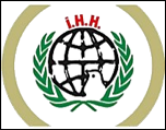
Turkish Humanitarian Relief Foundation
The Turkish Humanitarian Relief Foundation (“İHH İnsani Yardım Vakfı,” or IHH) is a Turkey-based international charity established in 1992 to aid Bosnian Muslims. IHH is active in more than 100 countries. * The charity stands accused of ties to al-Qaeda, Hamas, and foreign fighters in Bosnia, Chechnya, and Afghanistan. *
Links to Terrorism
- A January 2020 U.S. lawsuit filed by American photojournalist Matthew Schrier under the Anti-Terrorism Act against Qatar Islamic Bank (QIB) alleged that IHH and QIB formed a partnership to support Syrian jihadist group Ahrar al-Sham and the jihadist umbrella group Syrian Islamic Front. *
- In April 2016, the Russian government accused Turkish NGOs Besar Foundation, the Iyilikder Foundation, and the Turkish Humanitarian Relief Foundation (IHH) of providing weapons and material support to Syrian rebel groups. Russia’s U.N. Ambassador Vitaly Churkin accused the three groups of being fronts for Turkey’s MIT intelligence agency to provide support to rebel forces in the Syrian civil war. *
- In January 2014, Turkish police raided the IHH’s offices in the Turkish city of Kilis as part of a series of raids in six cities against individuals suspected of al-Qaeda links, according to the government. IHH denied the allegations. * Also that month, Turkish security forces stopped an IHH truck at the Syrian-Turkish border that was carrying weapons and ammunition into Syria. The drivers reportedly claimed they were transporting aid on behalf of the IHH. The IHH and Turkish Interior Minister Efkan Ala denied the accusations. *
- Syrian rebels have linked the IHH to the Muslim Brotherhood. In 2012, Syrian rebels from the Free Syrian Army told the United Kingdom’s Times that a ship carrying supplies from Libya had been designated for the FSA. But upon arrival, the rebels discovered that the ship had been registered to the IHH. An FSA member accused the Brotherhood of using its ties in Turkey and “seizing control of this ship and the cargo. This is what they do. They buy influence with their money and guns.” *
- Germany outlawed the IHH’s German branch in 2010 because the Turkish group “fights against Israel’s right to exist,” according to then-Interior Minister Thomas de Maiziere. IHH challenged the ruling, but a German federal administrative court upheld the decision in April 2012 because it found the IHH had made financial contributions to Hamas. *
- Israel banned the IHH in 2008 as part of a larger ban of international charities belonging to the umbrella of the Hamas-linked Union of Good charity. * On May 31, 2010, the IHH organized an aid flotilla to the Gaza Strip, which sought to break an Israeli naval blockade of Gaza. Israeli forces boarded the lead ship, the Mavi Mamra, resulting in the deaths of nine activists who violently resisted. * In June 2010, a bipartisan group of 87 U.S. senators called for the U.S. government to investigate designating the IHH as a foreign terror group. *
- During the 1990s, IHH allegedly contributed money to foreign fighters in Bosnia, Chechnya, and Afghanistan. * Retired French investigating judge Jean-Louis Bruguiere investigated the IHH in the 1990s as head of the French judiciary’s counterterrorism unit. IHH “were basically helping Al Qaeda when (Usama) bin Laden started to want to target U.S. soil,” Bruguiere told the Associated Press. Members of the so-called Fateh Kamel network worked at IHH as a cover while plotting Los Angeles International Airport on behalf of al-Qaeda. “It was too systematic and too widespread for the NGO (non-governmental organization) not to know,” according to Bruguiere. IHH denied any links to terrorism. *
Snapshot of Turkish Counterterrorism Legislation and Initiatives
Definition of Terrorism: Following the March 13, 2016, bombing in central Ankara, President Recep Tayyip Erdoğan demanded that the definition of “terrorist” be expanded to include those who support terrorism. According to Erdoğan, such individuals might include activists, lawmakers, or journalists. * He said: “Their titles as an MP, an academic, an author, a journalist do not change the fact that they are actually terrorists. An act of terror is successful because of these supporters, these accomplices.” *
Anti-Money Laundering/Countering Terrorism Finance (AML/CTF): Turkey is a member of the Financial Action Task Force (FATF). Within Turkey’s Ministry of Finance is the Financial Intelligence Unit (MASAK), which cooperates with similar international agencies to support FATF and implement its recommendations. * The U.S. Department of State has accused the Turkish government of failing to regularly review its non-profit sector or provide “adequate anti-money laundering/CFT outreach or guidance.” * More than 5,500 foundations and 100,000 associations are licensed through the General Director of Foundations, but there are too few auditors to appropriately monitor compliance with AML/CFT regulations. The State Department further believes that Turkey has focused its CTF efforts primarily on the PKK and the Gullen movement. *
Countering Violent Extremism: Turkey has several government programs to counter extremism. One is an outreach program administered by the Turkish National Police (TNP) that seeks to prevent radicalization through early contact with at-risk communities. This program aims to reach vulnerable populations before they are exposed to extremist propaganda and messages. The government’s Directorate of Religious Affairs, the Diyanet, oversees 85,000 mosques in the country while promoting a more moderate version of Islam and weakening radical Islamist messaging. The Diyanet tries to accomplish this aim by reinterpreting religious texts and teaching religious education under a more modern framework, and by staffing mosques with Diyanet officials. *
Policy Prescriptions
In order to better combat terrorism and terrorist financing, Turkey will need to fully enforce its own counterterrorism policies and increase the resources devoted to monitoring and countering terrorism financing, in particular within the non-profit sector.
Specifically, the United States must incentivize Ankara to:
- Arrest or expel all wanted and internationally designated individuals inside its borders, including the individuals outlined by CEP’s TURKEY-HARBORS campaign
- Expel or arrest all members of the Taliban, Haqqani network, Muslim Brotherhood, and Hamas delegations currently residing or operating inside Turkey
- Halt all direct support—financial, material, and strategic—to internationally designated terrorist organizations
- Allocate appropriate resources to government oversight of the financial aid non-profit sectors to prevent abuse by criminal and extremist elements
- Investigate and close non-government organizations, financial institutions, and charities with ties to international extremist movements